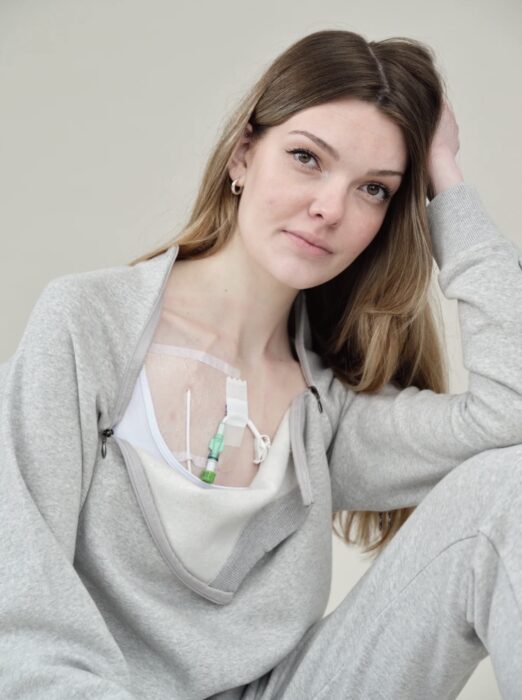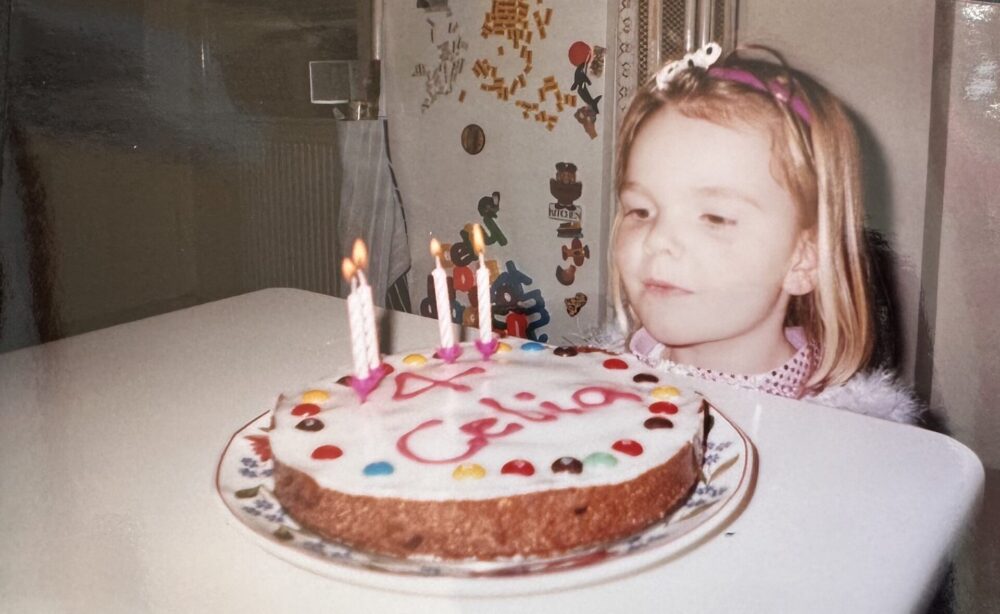There are more than 40,000 tube-fed people in the UK, and it can be one of the most isolating disabilities. Celia Chartres-Aris, who topped Shaw Trust’s Disability Power 100 list in 2024, speaks to Kate Stevenson about her experiences

Every day of her life is meticulously planned and controlled – it’s essential for Celia’s survival. Born with Loeys-Dietz Syndrome (LDS), she completely relies on Total Parenteral Nutrition (TPN) to receive nutrition directly through her veins.
Living with LDS can feel like you’re living on borrowed time – the average life expectancy for people born with the condition is just 37 years. But, at 28, Celia refuses to let the syndrome slow her down. Instead, she’s using the time she has to tackle the stigma surrounding feeding tubes.
NO FLEXIBILITY
“I’m not extraordinary,” Celia says with characteristic modesty. But spend five minutes in her company, and it’s impossible not to feel inspired.
Every day of her life is a masterclass in resilience. Since her teenage years, Celia has relied on feeding tubes. And, for the past four years, she’s been unable to consume any food at all – she solely depends on her central line to receive the nutrition her body needs.
“My entire schedule revolves around my infusion,” she reveals. “For five years, I’ve not slept past 6:30am – that’s when I unplug. By 5pm, I’m back on.
“There’s no flexibility – I have to unplug and plug in at the same time every day, no matter where I am.”
GLASS HALF-FULL
Life on TPN is far from straightforward. Unlike traditional feeding tubes, a central line comes with risks such as infections, blood clots, and line blockages, so it requires surgical- grade sterility. Even “a speck of dust could be enough to cause sepsis”, but finding suitable spaces to set up her equipment when she’s out of her home can be next to impossible for Celia.
“Travel is a nightmare,” admits Celia. “Two weeks away means packing 50 litres of fluid, needles, and everything else I need to stay alive. At the airport, I’m often strip-searched because security staff don’t understand what I’m carrying.”
But rather than wallow in frustration, Celia focuses on what she can control: “It’s tough, but I’ve learned to adapt,” she smiles. “I might not be able to eat, but I still enjoy hosting dinner parties and baking for my friends. It’s my way of staying connected.”

CHAMPIONING CHANGE
Celia’s experiences have made her a fierce advocate for those living with feeding tubes. When she was growing up, she didn’t see anyone like her in the media: “I felt invisible, and that was isolating.” It also meant that few people understood the challenges she faced in her everyday life.
Determined to change that, she’s speaking openly about her struggles and the hurdles she has encountered: “People assume feeding tubes are temporary or just for those with eating disorders,” she adds. “I’ve had people yell, ‘Are you anorexic?’ at me on the street. It’s horrible.”
Celia believes that part of the problem is the public perception surrounding gastrointestinal health. “Anything related to bowels, digestion, or eating habits is still so taboo,” she says, and she thinks this is the reason people avoid learning more about tube feeding. “But the lack of conversation creates barriers – not just in public understanding, but also in how the media represents people like me.”

FOOD-CENTRIC
Perhaps the hardest aspect is the social isolation it can cause. “Food is such a cornerstone of our culture,” explains Celia. “When you can’t eat or drink, it’s easy to feel left out. I’ve lost friends because they didn’t know how to include me anymore.”
The lack of understanding isn’t limited to friends and family. Celia recalls being kicked out of restaurants for not ordering food, and being stared at in public. “I’ve even had strangers pull on my line, asking, ‘What does this do?’ It’s invasive and dehumanising.”
Understandably, everyday life isn’t easy for Celia, and she’s been candid about the mental toll it’s taken. “At first, I avoided everything – parties, dinners, even coffee dates. I felt like I was ruining the fun for everyone else,” she recalls. “I used to cover up my central line because I didn’t want people to stare.”
But, over time, Celia has found ways to regain her confidence. “Eventually, I realised I wasn’t the problem. Society’s discomfort was,” she says. “Now, I wear what I want. If someone doesn’t like it, that’s their problem.”
STAND PROUD
While Celia strongly encourages anyone struggling to consult a medical professional, she acknowledges that “the NHS doesn’t provide enough resources to help people cope.” Instead, she offers this advice: “Don’t shut yourself away. You’re just as valuable as anyone else. Find joy where you can, whether that’s hosting a dinner party, or simply showing up for your friends.”
Ultimately, she hopes that, one day, the systemic barriers preventing tube-fed people from fully living their lives will disappear. Offering more mental health support, improving awareness, and greater societal flexibility are crucial steps towards that goal.
“I want people to realise that being different is the one thing we all have in common. Let’s start embracing it instead of shying away.”
